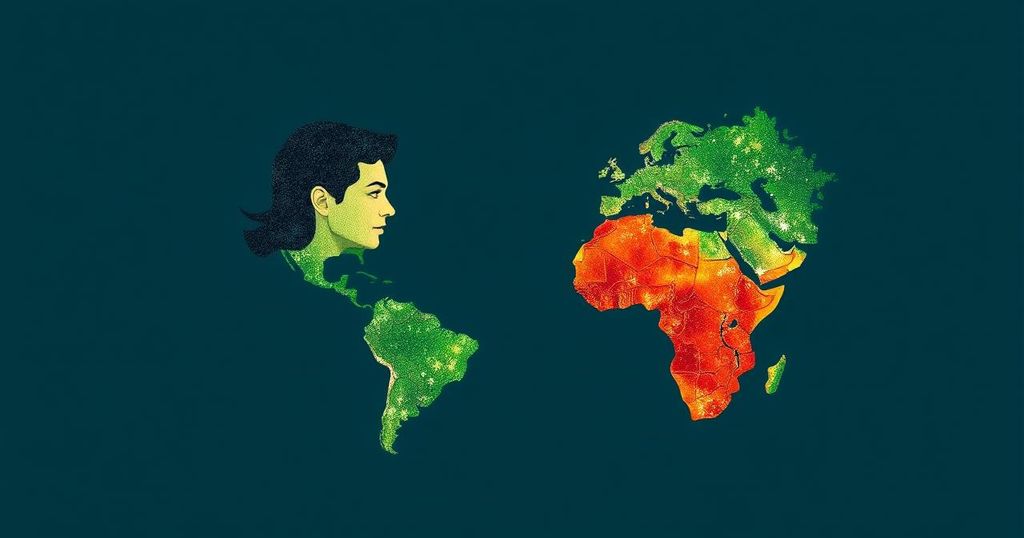Exploring Gendered Impacts of Climate Change: Ensuring a Just Transition for All
The article examines the gendered impacts of climate change, revealing that women disproportionately bear its burdens while men face unique challenges. It emphasizes the necessity of gender equality in climate policies, advocating for women’s inclusion in green economies and adaptation efforts to ensure a just transition. The disparities in access to resources and decision-making underscore the urgent need for intentional interventions to create equitable climate solutions.
As the climate crisis intensifies, it becomes increasingly evident that its impacts are not uniformly distributed across genders. In the lead-up to COP29 in Azerbaijan, it is vital to draw attention to how the repercussions of climate change manifest differently for men and women, particularly in vulnerable regions. Women traditionally shoulder the responsibilities for food, water, and energy management within their families. Consequently, environmental changes such as droughts and floods amplify their workloads and hinder their access to education and economic opportunities. For instance, the cooking methods predominantly used by women often involve highly polluting fuels, further exacerbating health issues and air quality concerns. In contrast, while men in rural areas may experience job losses in sectors directly affected by climate change, such as agriculture and fishing, their migration for work leads to familial and community disruptions, creating distinct social challenges. Furthermore, the transition toward a green economy, widely believed to benefit all, has the potential to deepen existing inequalities if not approached with intentionality. Women’s representation in green sectors, especially technical and leadership roles, remains disproportionately low. Illustratively, women constitute only about 30 percent of the STEM workforce, often relegated to lower-paying administrative positions. To rectify this, concerted efforts from governments, businesses, and civil society are required to promote women’s engagement in green industries and dismantle the social norms that deter their participation in STEM fields. The effects of climate-induced displacement also highlight gender disparities. Women are more vulnerable to violence, exploitation, and trafficking during forced migrations resulting from extreme weather events. Conversely, men may be compelled to abandon their families in search of urban employment, engendering new economic and social strains. For instance, in Central Asia, water scarcity drives migration, with women left behind struggling to manage farms and households in resource-scarce contexts, thus worsening their vulnerabilities and economic stability. Additionally, access to essential resources for climate adaptation is unevenly distributed. Women farmers frequently lack ownership of the land they cultivate, rendering them disadvantaged when seeking financial support for sustainable practices. In contrast, men, who predominantly own land, have easier access to loans and government resources, enabling a swifter adaptation to climate shifts. Lastly, achieving gender equality is not an incidental outcome of climate action; it necessitates deliberate intervention in all climate-related decision-making processes. Emphasizing women’s involvement yields superior results in climate resilience and the development of sustainable solutions. For instance, Makhinakhon Suleymanova, a STEMinist leader in Tajikistan, established a successful early warning system capitalizing on mobile technology to ensure that rural women access critical agricultural advisories promptly. In summary, a just transition transcends mere fossil fuel phase-out. It entails crafting an inclusive, sustainable economy that genuinely benefits all members of society. To achieve this, gender equality must be interwoven into climate and economic policies, dismantling persistent barriers faced by women. Empowering women through equal access to resources, education, and leadership enhances innovation and fosters the development of resilient communities.
The article discusses the disparate impacts of climate change on men and women, emphasizing the need for gender equality in climate policies and actions. It outlines how women, particularly in rural and vulnerable areas, bear the brunt of climate change effects due to their roles in managing resources. Additionally, it highlights the importance of women’s participation in green sectors during the transition to a sustainable economy and the necessity for conscious efforts to implement gender-responsive policies that consider the unique challenges faced by both genders. This background is essential to understand the systemic inequalities exacerbated by climate change and the potential for implementing solutions that foster inclusivity.
The analysis underscores the critical need for gender-responsive approaches in addressing climate change, highlighting that without intentional inclusion of both men and women in climate decision-making, the just transition will likely perpetuate existing inequalities. Therefore, achieving gender equality is paramount to creating a sustainable economy that benefits all, leading to improved social and economic outcomes for communities affected by climate change.
Original Source: www.undp.org




Post Comment